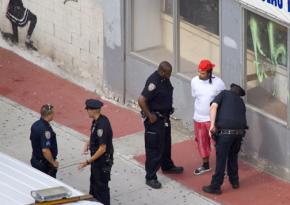Stop-and-frisk on trial
reports on an important court case against the New York Police Department's racist use of "stop-and-frisk."
THE PEOPLE of New York showed their discontent with the New York Police Department's illegal and dehumanizing "stop-and-frisk" policy by flooding the courtroom on the first day of the landmark case, Floyd et al. v. City of New York, on March 18.
The case, filed by the Center for Constitutional Rights (CCR) in 2008, is a federal class action lawsuit on behalf of four plaintiffs who were unlawfully searched on the basis of race. The plaintiffs--David Floyd, David Ourlicht, Lalit Clarkson and Deon Dennis--represent thousands of New Yorkers who have been unlawfully violated and stripped of their basic constitutional rights on the basis of their race.
The overwhelming presence of opponents of stop-and-frisk in the courtroom shows that the people of New York are taking a stance against the racist police policies that are plaguing communities of color in New York City.
In the press conference that immediately followed the first day of the trial, several men and women of color gave personal testimonials about their experience of being stopped and frisked.

The trial is expected to span the next five to six weeks, and it could possibly set legal precedent in regards to racial profiling in New York as well as other U.S. cities.
Floyd v. City of New York stems from the landmark case of Daniels, et al. v. City of New York, a lawsuit filed by the CCR in 1999 that similarly challenged NYPD's stop-and-frisk policy on the grounds that it violated the Fourth Amendment and the Equal Protection Clause.
In Daniels, the CCR sought the disbandment of the notorious Street Crime Unit (SCU)--a unit of more than 300 undercover police officers that unlawfully and maliciously targeted communities of color under the guise of "crime patrollers."
The tragic murder of Amadou Diallo, a 23-year-old Guinean immigrant who SCU officers shot 41 times outside his Bronx apartment in 1999, sparked massive demonstrations against police brutality, racial profiling and the lack of police accountability throughout New York City.
Shortly after Diallo's killing, the NYPD released statistics that showed that the SCU executed stop-and-frisks almost exclusively along racial lines. Furthermore, an overwhelming majority of the citizens the SCU stopped were innocent of any crime and therefore weren't brought in for arrest.
The NYPD disbanded the SCU in 2002, largely as a result of mass mobilizations against police brutality after Diallo's murder and the lawsuit filed by the CCR. In the subsequent settlement of Daniels, Federal District Court Judge Shira Scheindlin--who is the judge currently presiding over Floyd v. City of New York--demanded that the NYPD develop a binding, anti-racial profiling policy that adhered to the New York and U.S. constitutions.
The ruling also required that the NYPD audit officers who engaged in stop-and-frisks to determine the extent to which the officers based their stops on reasonable suspicion, and that the NYPD provide documentation to the CCR on a quarterly basis.
Furthermore, the settlement required the NYPD to actively participate in public education workshops in numerous New York City high schools on the legal rights of individuals who are subjected to a stop-and-frisk.
The NYPD, however, failed to comply with the settlement. In fact, there was a drastic spike in the number of stop-and-frisks after this ruling. In response, the CCR decided to file a new class action lawsuit, Floyd et al. v. City of New York, which saw its first day of trial on March 18.
THE SIGNIFICANCE of this case shouldn't be understated. As a policy that has assisted in the systematic arrest and incarceration of young men and women of color within a racist injustice system, stop-and-frisk must be opposed on all sides.
As Darius Charney, the lawyer for the four plaintiffs, pointed out, the NYPD's stop-and-frisk policy is an "arbitrary, unnecessary and unconstitutional" policy and a "frightening and degrading experience" for millions of New Yorkers.
Trial testimony will include statements from numerous Black and Hispanic men who have been targeted by stop-and-frisk as well as statements from police officers and criminologists.
Lawyers will also dissect hours of "The NYPD Tapes," secret recordings compiled by Adrian Schoolcraft, a former NYPD officer and whistle-blower who said he was intimidated and then involuntarily hauled off to a psychiatric ward after he accused police officials of imposing illegal arrest quotas. Other police whistle-blowers are set to testify as well.
The powerful testimonials and statistical evidence provided during the next month will challenge the constitutionality of the NYPD's tactics. The expert reports released by the CCR not only prove that stop-and-frisks are executed almost exclusively along racial lines, but they also show that Blacks and Latinos are far more likely to be subjected to excessive physical force during a stop.
According to the CCR, the use of physical force by police officers "has a greater likelihood of occurring than arrests or the issuance of a summons combined." Furthermore, the reports challenge the basic premise of stop-and-frisk--the yield rate for weapons and contraband rarely ever reaches 1 percent.
The potential ruling of stop-and-frisk as an unconstitutional policy would be an important legal victory in the fight against racial profiling in the U.S., one of the key agents of the prison-industrial complex that has been used to justify the criminalization of Blacks and Latinos.
"This is one of the most important trials facing New York City," said CCR Executive Director Vince Warren. The coming month provides an opportunity for anti-racist activists to mobilize to pressure the courts to set legal precedence in Floyd v. City of New York.


